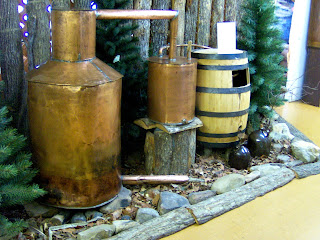The Income Tax and Prohibition
The introduction of income tax in the United States in 1913 had a significant impact on the country's economy and culture. One of the unintended consequences of this new tax was the rise of the illegal production and sale of alcohol, known as moonshine or home-distilled liquor. In this blog post, we'll explore the relationship between income tax and prohibition, and how it led to the popularity of home distilling and moonshine.
The Income Tax and Prohibition
Before the introduction of income tax, the US government relied on import and export taxes, as well as excise taxes on goods like tobacco and alcohol, to fund its operations. However, with the passage of the 16th Amendment in 1913, Congress was given the power to levy an income tax on individuals and corporations. This new tax was intended to provide a stable source of revenue for the government and reduce its reliance on volatile tariffs and excise taxes.
Around the same time, the temperance movement in the US was gaining momentum. Prohibitionists argued that alcohol consumption was a major social problem that contributed to crime, poverty, and other social ills. In 1919, Congress passed the 18th Amendment, which prohibited the manufacture, sale, and transportation of alcohol in the US. Prohibition went into effect in 1920 and lasted until 1933.
The Rise of Moonshine
While Prohibition was intended to reduce alcohol consumption and improve public health, it had the unintended consequence of increasing the popularity of home distilling and moonshine. With the legal sale of alcohol banned, many people turned to illegal means of obtaining it. Home distilling became a popular way to produce alcohol, especially in rural areas where it was difficult to obtain liquor from urban bootleggers.
Moonshine was a particularly popular form of home-distilled alcohol. It was made from corn, sugar, or other ingredients and distilled in small batches using homemade stills. Because it was made in small quantities and was difficult to regulate, moonshine was often of varying quality and potency, leading to health risks for those who consumed it.
Home Distilling and Moonshine
For those interested in home distilling and moonshine, it's important to understand the history of these practices and the relationship between income tax and Prohibition. While home distilling and moonshine are still illegal in many states, there is a growing interest in these practices among hobbyists and enthusiasts.
If you're interested in learning more about home distilling and moonshine, there are many online resources available, and moonshinestillpro.com is a great place to start. They offer a wide range of information on home distilling, including moonshine recipes, tips for building your own still, and more. However, it's important to remember that home distilling and moonshine can be dangerous, and it's illegal in many areas. Be sure to do your research and proceed with caution if you decide to pursue these hobbies, and always follow the law.



Comments
Post a Comment